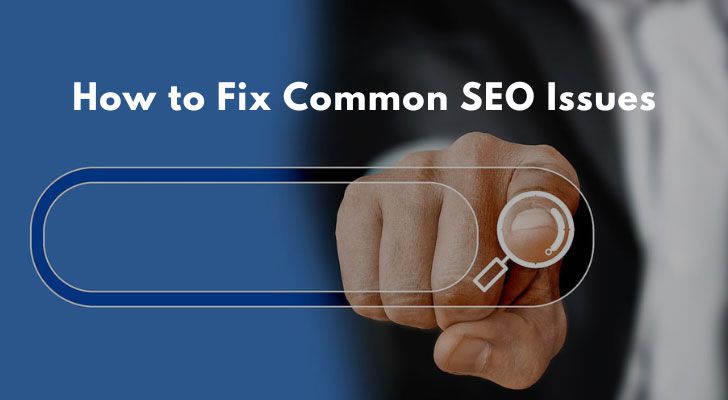It's not always easy to achieve good SEO for a website that wants to rank high in search engine results pages (SERPs). In fact, even the most experienced SEO professionals sometimes make mistakes that can hurt their ranking. If you’re having trouble with your SEO and you’re not sure how to fix them, this blog post is for you. I will cover some of the most common SEO issues and show you how to fix them so you can start ranking higher in SERPs.

What Is SEO?
Search engine optimization increases the visibility and rankings of websites or web pages on search engine result pages (SERPs).
SEO is a part of SEM (search engine marketing) and can be divided into two main categories: on-page SEO and off-page SEO. On-page SEO refers to all the measures that can be taken directly within the website in order to improve its position in the search ranking. This includes optimizing the website content, structure and design, as well as optimizing individual pages for specific keywords. Off-page SEO, on the other hand, refers to all the measures that can be taken outside of the website to influence the visibility and ranking of a page. This includes link-building, social media engagement and other online marketing activities.
One common issue with SEO is duplicate content. This happens when there is more than one version of a page with identical or very similar content. This can be a problem because it confuses search engines and can result in lower rankings or even de-indexing of a site. Another common issue is thin content, which is content that lacks substance or depth. This type of content is often generated by automated means or simply copied from other sources. It provides little value to users and will not help a website rank high in search results.
These are just some of the most common SEO issues that can occur. If you suspect that your site may have any of these issues, it is important to address them as soon as possible in order to improve your chances of ranking high in search results.
The Different Types of SEO
So, on-page SEO refers to the optimization of a website’s content and structure in order to make it more visible to search engines. Off-page SEO, on the other hand, entails the promotion of a website through link building and other means in order to increase its authority.
Both on-page and off-page SEO are important for any website that wants to rank high in search engine results pages (SERPs). However, many websites focus too much on one type of SEO to the detriment of the other. As a result, they don’t see the full benefits of an effective SEO strategy.
To avoid this issue, it’s important to understand the difference between on-page and off-page SEO and how they work together.
On-Page SEO

On-page SEO is all about optimizing a website’s content and structure so that it is more visible to search engines. When done correctly, on-page SEO can help a website rank higher in SERPs for relevant keywords and phrases. There are many different factors that go into on-page optimization, but some of the most important ones include:
Title tags:
The title tag is one of the most important elements of on-page optimization. This HTML element tells search engines what your page is about, so it’s important to include relevant keywords in your title tags.
Meta descriptions:
The meta description is another important HTML element. This short description appears under your page’s title in SERPs, so it’s a good place to include a call to action or some additional information about your page.
Header tags:
Header tags are used to structure your content in an easy-to-read format. As well as helping search engines understand your content's hierarchy, they also help with navigation. As such, it’s important to use header tags (H1, H2, H3, etc.) when creating content for your website.
Keywords:
Keywords are the foundation of on-page optimization. The content of your website should include certain keywords so that it will rank for those keywords. However, you should avoid keyword stuffing, which is the act of cramming too many keywords into your content in an attempt to manipulate SERPs.
Image optimization:
Images can help make your content more engaging and visually appealing. However, they can also impact your website’s SEO. That’s why it’s important to optimize your images by including relevant keywords in their file names and alt text.
Site speed:
Site speed is a ranking factor for many search engines, so it’s important to make sure your website loads quickly. There are a number of ways to improve your site speed, such as optimizing your images and using a content delivery network (CDN).
What Do You Advocate?
Common On-Page SEO Issues
If you're not familiar with on-page SEO, then you're probably not optimizing your site for the search engines. This means that your site will likely rank lower in the search results, and you'll miss out on potential traffic and customers. Here are some common on-page SEO issues and how to fix them:
1. Not Using Keywords Correctly
Make sure you are using your target keywords throughout your content, including in the title, header tags, and in the body of the text. Invest some money on a good keyword tool such as Jaaxy and Ubersuggest. There are some free keyword tools out there but they don't generally give you target search results, so it's worth spending some money on a premium tool.
2. Keyword Stuffing
Keyword stuffing is when you stuff too many keywords into your content in an attempt to rank higher in search engine results pages (SERPs). This not only looks spammy and unprofessional, but it will actually hurt your ranking. Stick to using 1-2 keywords per page maximum, and focus on creating quality content instead.
30 x premium keyword searches for FREE with Jaaxy
3. Not Optimizing Images
Whenever you upload a photo to your website, be sure to include keywords in the file name and fill out the alternate text field with a brief description of the image.
4. Not Creating Quality Content
One of the most important aspects of off-page SEO is creating quality content. If your content isn't good enough, then people won't want to link to it or share it, which will hurt your ranking in the search results. To fix this, focus on creating high-quality, informative, and interesting content that people will want to read and share.
5. Not Creating Enough Content
A common issue with many websites is that they don’t have enough content. Google loves fresh, relevant content, so aim to add new blog posts or pages on a regular basis.
6. Short Content
Not only does short content provide little value to readers, but it also tells search engines that your site isn't particularly relevant or useful. Make sure every page on your site has at least 300 words of well-written, keyword-rich content to avoid this issue.
7. Not Linking To Other Pages On Your Site
Internal linking is important for two reasons: it helps Google crawl your site more easily and it keeps visitors on your site longer (which can improve your search ranking). Be sure to link to other relevant pages on your website whenever possible.
8. Not Mobile-Friendly
It's absolutely essential to have a mobile-friendly website. Google penalizes websites that are not mobile-friendly, so make sure yours is responsive and easy to navigate on all devices.
Off-Page SEO
Off-page SEO is all about promoting your website through link building and other means in order to increase its authority. When done correctly, off-page SEO can help you rank higher in SERPs and drive more traffic to your website. Some of the most effective off-page SEO techniques include:
Link building:
Link building is the process of acquiring links from other websites. These links act as votes of confidence from other websites, telling search engines that your website is credible and trustworthy. As such, link building is an effective way to improve your website’s SEO.
Social media marketing:
Social media platforms can be used to promote your website and drive traffic to your content. Choose the ones where you engage with your followers most frequently, and don't forget to use hashtags. By sharing your content on social media and engaging with other users, you can give your website a boost in the SERPs.
Common Off-Page SEO Issues

Common Off-Page SEO Issues
Here are some common off-page SEO issues and how to fix them:
1. Not Promoting Your Content Enough
Another common mistake is not promoting your content enough. Just because you create great content doesn't mean that people will automatically find it and share it. You need to actively promote your content through social media, email marketing, guest blogging, and other channels. Otherwise, it'll be lost in the sea of online content and you won't get the exposure or traffic that you want.
2. Not Building Enough Links
Link building is another important aspect of off-page SEO. The more links you have pointing to your website, the higher you'll rank in the search results. However, simply building links isn't enough. You need to make sure that the links are high quality and come from reputable sources. Otherwise, they could actually hurt your ranking in the search results.
3. Not Tracking Your Progress
Finally, one of the most common mistakes people make with off-page SEO is not tracking their progress. It's important to keep track of your rankings in the search results, your traffic levels, and your conversion rates so that you can see what's working and what's not. Without this data, it'll be difficult to improve your results over time.
4. Not Taking Advantage of Social Media
Promoting your content on social media can help it reach a larger audience. Be sure to share each new blog post on social media sites like Facebook and Twitter.
Deeper On-Page SEO Techniques
There is an advanced level of on-page SEO techniques, concerned with the behind-the-scenes infrastructure of your website and making sure it is configured correctly to be crawled and indexed by search engines. Most of these issues are relatively easy to fix if you have a little bit of technical know-how. Some common technical SEO issues include:
1. Incorrectly Configured Server Settings
If your website's server is not properly configured, search engines may have difficulty crawling and indexing your content. This can be easily fixed by contacting your web hosting provider and asking them to make sure your server is set up correctly.
2. Improperly Formatted HTML
Incorrectly formatted HTML can make it difficult for search engine crawlers to understand your website's structure and content. This can be fixed by running your HTML through a validator tool to check for errors, and then correcting any errors that are found.
3. Broken Links
Broken links on your website can prevent search engines from crawling certain pages, such as links that lead to 404 error pages. These can occur when a page is moved or deleted without redirecting the old URL, or if there's a typo in the link.
Either way, broken links hurt your SEO by making your site look unprofessional and unreliable. To fix broken links, use a tool like Screaming Frog to locate the broken links on your site and either delete them or update them to point to the correct page.
4. Missing or Incorrect Meta Tags
Meta tags provide information about your website to search engines, so it's important that they are accurate and up-to-date. If you're using a content management system (CMS) such as WordPress, you can usually install a plugin that will automatically generate accurate meta tags for you.
5. Slow-Loading Pages
Pages that take too long to load can frustrate visitors and cause them to leave your site, which can hurt your rankings. To improve your page loading times, consider using a content delivery network (CDN), optimizing your images, and minifying your HTML, CSS, and JavaScript files.
6. Improperly Configured robots.txt File
The robots.txt file is used to tell search engine crawlers which pages on your website they should and shouldn't crawl. If this file is not configured correctly, it can prevent search engines from crawling important pages on your site.
7. Duplicate Content
Search engines may penalize websites that have large amounts of duplicate content, so it's important to avoid duplication whenever possible. If you do have duplicated content on your site, you can use the rel="canonical" tag to tell search engines which version of the content is the original.
SEO Techniques For A Local Business Website

SEO Techniques For A Local Business Website
Optimizing a website for local SEO is crucial for any business that wants to be visible online to potential customers in their service area. After all, nearly half of all Google searches are seeking local information, and if your business doesn’t show up in the results, you’re missing out on a lot of potential customers.
In addition to the on-page and off-page SEO, a few more things you can do to improve your local business SEO.
- Make sure your website is optimized for local search. This means including your city and state in your titles and metatags, as well as ensuring that your NAP (name, address, and phone number) is consistent across the web. Also, create local content that is relevant to your audience in the area that you know very well.
- Claim your Google Business Profile listing and make sure all of your information is accurate and up-to-date.
- Build local links by getting listed in directories and partnering with other businesses in your area.
Are There Special SEO Techniques For an E-Commerce Site?
E-commerce sites have a unique set of SEO challenges that need to be addressed in order for them to rank well in search engine results pages. It can help you reach new markets, connect with customers, and make it easy for customers to find your products. It can also help you build brand awareness and credibility, and increase sales.
Search engine optimization is a key part of e-commerce, and can help you draw more visitors to your site and improve your visibility in search engines.
SEO On Product Pages
Make sure that each product page is optimized for the relevant keywords, as this is what will ultimately drive traffic and sales. Also, keep in mind that people often search for specific product names or brands when they are looking to make a purchase, so be sure to include these in your title tags, meta descriptions, and on-page content. Some of the most effective on-page SEO techniques for eCommerce sites include;
Optimize Product Titles And Descriptions
Product titles and descriptions should be keyword rich and give searchers an accurate idea of what the product is and does.
Create Informative Product Pages
Make sure that your product pages are informative and also keyword-rich. Include detailed descriptions, product photos, customer reviews, etc.
Incorporate Customer Reviews
Customer reviews provide valuable content that can help improve your e-commerce site’s search engine ranking while also helping to build trust with potential customers.
Don't forget about off-site SEO techniques such as link building and social media marketing. These can be extremely effective in driving traffic to your e-commerce site and should not be overlooked.
How to Fix Common SEO Issues: Conclusion
SEO may seem like a complex and time-consuming process, but it’s not too difficult to master. By fixing common SEO issues, you can improve your website's ranking in search engines and attract more organic traffic. While there are many factors that contribute to a successful SEO strategy, addressing these common issues is a good place to start.
How I "Finally" Make Over $7,000 Monthly Income
"The most valuable thing I've ever done!"


Great post, much appreciated, what sort of valuable data did you mean? What results did you get after applying these SEO skills?
Hello Cybercash Worldwide,
Thank you for your advice to fix SEO problems. I would be interested in speaking with someone about the possibility of working with you to improve my company’s online visibility. Please let me know if there is a time that works best for you. I wanted to reach out and let you know about my experience working with SEO agents like myself. I am confident that I have the skills and abilities to help your company achieve the top rankings in search engines. If you would like to discuss a potential job offer, please do not hesitate to contact me. Thank you for your time and consideration.
Thank you again for your help!
Jerry Landon